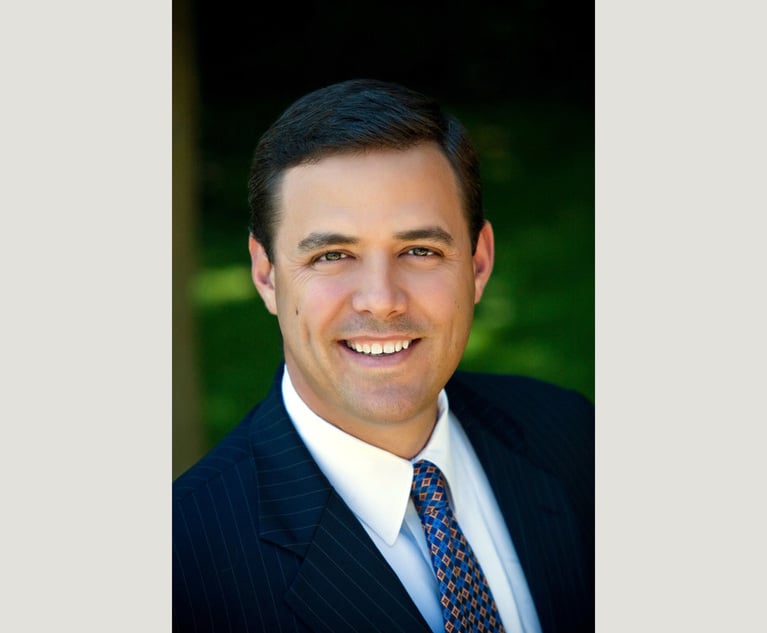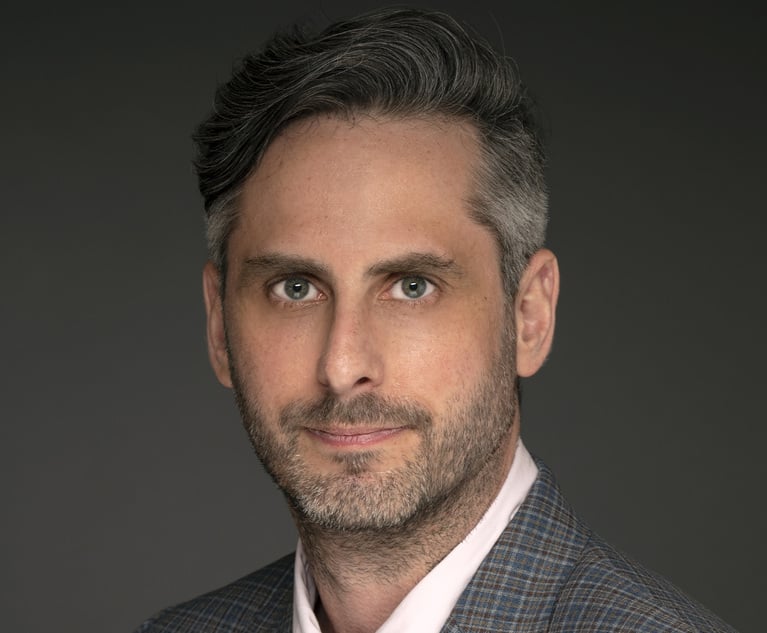Next Generation Women Leaders in Tech Law 2018: Sara Giardina, Lyft Inc.
"I loved (and still love) the idea of working in an industry that directly affects the lives of the everyday person," says Giardina, who is senior counsel, litigation at Lyft. "Technology is shaping humanity, and it's a privilege for all of us to be part of that."
November 12, 2018 at 04:35 PM
4 minute read
 Lyft driver lounge called the Hub. Located at 2300 26th Street in San Francisco. (Photo: Jason Doiy/ALM)
Lyft driver lounge called the Hub. Located at 2300 26th Street in San Francisco. (Photo: Jason Doiy/ALM)
Sara Giardina, who is senior counsel, litigation at Lyft, has served as the company's principle IP litigation adviser for the past three years and has been the lead litigator on a wide variety of complex litigation matters including Telephone Consumer Protection Act, Fair Credit Reporting Act, patent infringement, and worker misclassification matters. Additionally, she's been the architect of Lyft's Law Enforcement Request team, which was created to partner with and assist federal, state and local law enforcement.
What kinds of new technologies should tomorrow's lawyers be able to use effectively?
Lawyers should be taking advantage of all the tools available today that encourage communication and information sharing. There are a lot of incredible lawyers out there. Go learn from them.
What's one area of technology that you're most excited about and why?
Definitely autonomous vehicles. Other recent advancements in transportation technology have been life-changing, and I can't wait to see how the next innovations in transportation continue to improve the environment and accessibility for all.
Who is the most important mentor you've had thus far in your career? Why?
Lyft's head of litigation. She has a personality and working style that is similar to mine in many ways, and I think those similarities allow her to provide me guidance with empathy and kindness. She has not hesitated to express vulnerability and communicate her personal experience in ways that I can directly apply to my own career trajectory.
What's the best part of working in the tech sector?
I love the pace of the work, and that there is always a new challenge. We are lucky to work in an industry where the opportunities to learn and grow are never-ending, and we are surrounded by brilliant people from whom we can learn an enormous amount.
What's the biggest challenge?
We don't always have all the resources we might like, and it can be uncomfortable at times to not have the resources to deliver a “perfect” result. Over time, it becomes easier to assess what work truly does need to be fully resourced and which work can be handled adequately with what we have immediately at our disposal.
How do you describe what you do for a living to people you're meeting for the first time?
I work to solve Lyft's problems, legal or otherwise.
What's one way technology has made your life easier?
Ride-sharing! It's hard to even remember what my life was like without ride-sharing, even though it wasn't very long ago. It has truly changed how I function on a daily basis.
Name an important opportunity you've had in your career and what you did with it.
The first time I gave an oral argument in federal court, I was asked by the partner to handle the argument on about 18 hours notice. I wasn't sure if I was prepared to handle such a big responsibility under such a short time frame and considered declining, but I decided that I should seize the opportunity. The experience increased my confidence, and it showed me what I am capable of when given the opportunity.
What drew you to practicing law in the technology industry?
I loved (and still love) the idea of working in an industry that directly affects the lives of the everyday person. Technology is shaping humanity, and it's a privilege for all of us to be part of that.
What's the best piece of career advice anyone ever gave you?
Say yes to opportunities, even if it scares you, and even if it feels like it's outside the scope of “your job.” If you take on projects that push you outside your comfort zone, no matter the outcome, you will grow from those experiences. If you agree to work on something that is outside the scope of your expertise or your typical role, then you have an opportunity to not only grow as a person and lawyer, but also establish a reputation for yourself as someone who rises to the challenge.
This content has been archived. It is available through our partners, LexisNexis® and Bloomberg Law.
To view this content, please continue to their sites.
Not a Lexis Subscriber?
Subscribe Now
Not a Bloomberg Law Subscriber?
Subscribe Now
NOT FOR REPRINT
© 2025 ALM Global, LLC, All Rights Reserved. Request academic re-use from www.copyright.com. All other uses, submit a request to [email protected]. For more information visit Asset & Logo Licensing.
You Might Like
View All
How I Made Office Managing Partner: 'Stay Focused on Building Strong Relationships,' Says Joseph Yaffe of Skadden

US Patent Innovators Can Look to International Trade Commission Enforcement for Protection, IP Lawyers Say

How the Deal Got Done: Sidley Austin and NWSL Angel City Football Club/Iger

How Uncertainty in College Athletics Compensation Could Drive Lawsuits in 2025
Trending Stories
- 1SDNY Criminal Division Deputy Chief Returns to Debevoise
- 2Brownstein Adds Former Interior Secretary, Offering 'Strategic Counsel' During New Trump Term
- 3Tragedy on I-95: Florida Lawsuit Against Horizon Freight System Could Set New Precedent in Crash Cases
- 4Weil, Loading Up on More Regulatory Talent, Adds SEC Asset Management Co-Chief
- 5Big Banks Did Great Last Year. What Does That Mean for Big Law?
Who Got The Work
J. Brugh Lower of Gibbons has entered an appearance for industrial equipment supplier Devco Corporation in a pending trademark infringement lawsuit. The suit, accusing the defendant of selling knock-off Graco products, was filed Dec. 18 in New Jersey District Court by Rivkin Radler on behalf of Graco Inc. and Graco Minnesota. The case, assigned to U.S. District Judge Zahid N. Quraishi, is 3:24-cv-11294, Graco Inc. et al v. Devco Corporation.
Who Got The Work
Rebecca Maller-Stein and Kent A. Yalowitz of Arnold & Porter Kaye Scholer have entered their appearances for Hanaco Venture Capital and its executives, Lior Prosor and David Frankel, in a pending securities lawsuit. The action, filed on Dec. 24 in New York Southern District Court by Zell, Aron & Co. on behalf of Goldeneye Advisors, accuses the defendants of negligently and fraudulently managing the plaintiff's $1 million investment. The case, assigned to U.S. District Judge Vernon S. Broderick, is 1:24-cv-09918, Goldeneye Advisors, LLC v. Hanaco Venture Capital, Ltd. et al.
Who Got The Work
Attorneys from A&O Shearman has stepped in as defense counsel for Toronto-Dominion Bank and other defendants in a pending securities class action. The suit, filed Dec. 11 in New York Southern District Court by Bleichmar Fonti & Auld, accuses the defendants of concealing the bank's 'pervasive' deficiencies in regards to its compliance with the Bank Secrecy Act and the quality of its anti-money laundering controls. The case, assigned to U.S. District Judge Arun Subramanian, is 1:24-cv-09445, Gonzalez v. The Toronto-Dominion Bank et al.
Who Got The Work
Crown Castle International, a Pennsylvania company providing shared communications infrastructure, has turned to Luke D. Wolf of Gordon Rees Scully Mansukhani to fend off a pending breach-of-contract lawsuit. The court action, filed Nov. 25 in Michigan Eastern District Court by Hooper Hathaway PC on behalf of The Town Residences LLC, accuses Crown Castle of failing to transfer approximately $30,000 in utility payments from T-Mobile in breach of a roof-top lease and assignment agreement. The case, assigned to U.S. District Judge Susan K. Declercq, is 2:24-cv-13131, The Town Residences LLC v. T-Mobile US, Inc. et al.
Who Got The Work
Wilfred P. Coronato and Daniel M. Schwartz of McCarter & English have stepped in as defense counsel to Electrolux Home Products Inc. in a pending product liability lawsuit. The court action, filed Nov. 26 in New York Eastern District Court by Poulos Lopiccolo PC and Nagel Rice LLP on behalf of David Stern, alleges that the defendant's refrigerators’ drawers and shelving repeatedly break and fall apart within months after purchase. The case, assigned to U.S. District Judge Joan M. Azrack, is 2:24-cv-08204, Stern v. Electrolux Home Products, Inc.
Featured Firms
Law Offices of Gary Martin Hays & Associates, P.C.
(470) 294-1674
Law Offices of Mark E. Salomone
(857) 444-6468
Smith & Hassler
(713) 739-1250






